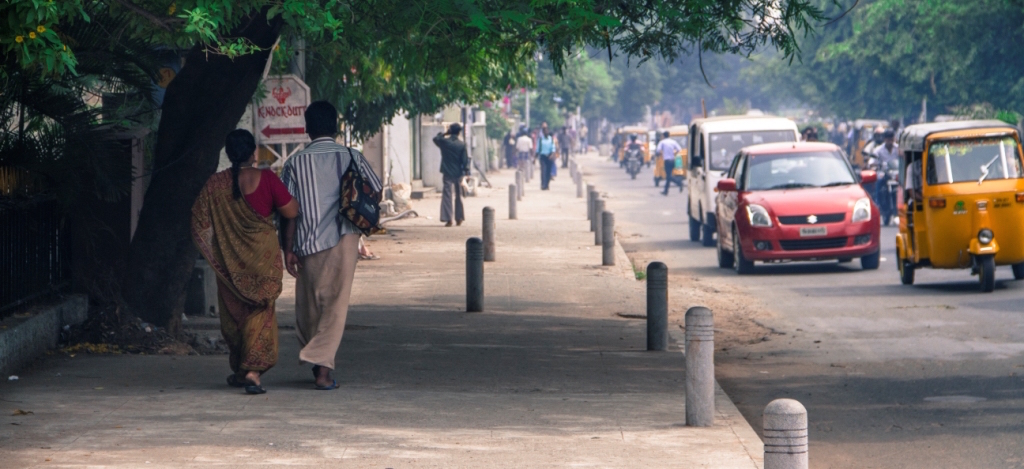For the past several years, the city of Chennai has been taking bold, rational, and consistent steps towards a sustainable future. New footpaths are making walking more accessible for city residents. The Corporation introduced new capacity building programs for municipal engineers. A new Car Free Sunday initiative is engaging more residents to explore their city on foot. And the progressive non-motorised transport policy adopted by the city, which allocates 60% of transport funding for non-motorized transport, has inspired many national and international cities to adopt similar policies.
For this comprehensive approach to improving sustainable transport, the Corporation of Chennai has been recognized with the 2015 Sustainia Award, presented by the Danish think tank, Sustainia. The Sustainia Awards identify innovative and demonstrated sustainable solutions from across the world. Chennai’s Street Design Project was selected as the best solution of 2015 for transforming Chennai from a car-centric to a people-friendly city and addressing safety concerns and air pollution in one go.
The award was originally presented on December 6th at the Paris Climate Conference, and was received by ITDP CEO Clayton Lane on behalf of the city. Chennai officials were unable to attend the event, as they were responding to torrential rains that hit Chennai in early December 2015. ITDP has been one of the principal partners on the project. On January 23rd, the Corporation of Chennai, ITDP, the Chennai City Connect, and numerous partners came together to celebrate the success of the project.
“The city has set a new example in the country by prioritising people over cars with the adoption of the non-motorized transport policy,” said Saidai Duraisamy, the proud Mayor of Chennai, as he received the award from Clayton Lane.

(Left) The Mayor of Chennai receiving the award from Clayton Lane (Right) Clayton Lane receiving the Sustania award on behalf of Chennai at the Paris award ceremony.
These new policies are necessary to combat the decline in walking and cycling in the city in recent years. “The mode share of vehicles and two wheelers have rapidly increased. Although this is a sign of economic development, it is also a matter of concern due to the rising level of pollution and road accidents. We need to work towards becoming a safer, healthier city,” stated Vikram Kapur, former Commissioner of Chennai, during whose term many projects promoting non-motorised transport were initiated.
The heightened risk of air pollution was further stressed by B Chandra Mohan, Commissioner of Chennai, who added that pollution is a problem that can wait no longer. To this end, Clayton Lane emphasized the major impact sustainable transport can have, citing ITDP research showing how “a considerable switch to walking and cycling can reduce these emissions in half.”
The speakers highlighted that the street design process needs to be balanced and include the needs of all stakeholders who are an integral part of the cityscape.
Everyone needs to come together to build a walkable Chennai, and the event brought together people who contributed to the cause in various ways—architects who assisted the city in street design, community agencies, academic institutions, media partners and the traffic police—who were felicitated at the event.
While Chennai has taken the first steps towards developing a people centric city, the next challenge will be addressing the encroachment onto footpaths by parked vehicles, and the stakeholders gathered for the Sustania Award celebration took some time to discuss best practices in parking regulation and management. “Parking is like a magnet that attracts more cars. Providing more parking is not the solution to tackle this problem,” asserted Shreya Gadepalli, Regional Director, ITDP India, as she presented some of the myths associated with on-street and off-street parking along with progressive solutions.
The panel discussion saw active participation from Kavitha Selvaraj, C.R.Narayana Rao architects; Rajesh Gurumurthy from JLL India; Dr. Sumanthran, executive committee member of Chennai City Connect; Vikram Kapur; and Clayton Lane; who all agreed on the importance of enforcing and regulating parking.

1 parking space occupies the same space as an affordable housing unit. What should we prioritize, parking or people?
Spurred on by the successes of the non-motorized transport movement, progress on new issues looks hopeful. With strong political will and a collaborative effort from different stakeholders and policy makers, Chennai looks all set to walk into a sustainable future.
Presentation on Parking Basics
More pictures of the Sustania event










